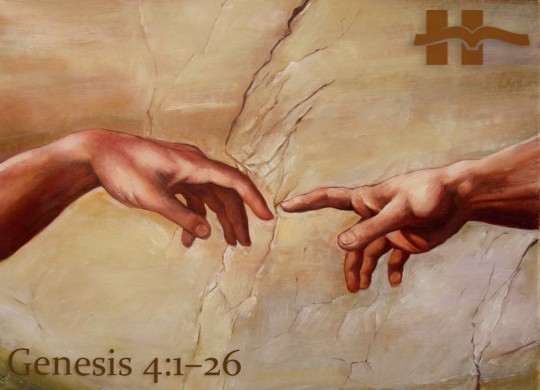Genesis 4:1−26

Man’s pride propagates and perpetuates his sinful rebellion against God, inviting God’s discipline, while God’s grace promises respite from the effects of sin.
Adam and Eve do not have to wait for each other’s death to see God’s judgment of death come to pass—the catastrophic consequence of their rebellion. Before the end of their own lives, they are witness to the slaying of their second son, and the exile of their first away from the presence of God. While Gen 2:4–3:24 dealt with the breakdown primarily of the man-God relationship, 4:1–26 concerns itself with the fragmentation of inter-human relationships.
The two sons of Adam bring offerings to God (Gen 4:3–4): Abel brings firstlings (that were reserved for God: Lev 27:26; etc.) and note that he brought their choicest portions—the fat (always a positive connotation with regard to sacrifices: Lev 3:3–5, 9–11, 14–16; 4:8–10, 26, 31; etc.). Cain does not bring firstfruits (Lev 2:14; etc.); his is merely “of the fruit of the ground” (Gen 4:3). Abel appears to have taken pains to give the best, and his intent is clear; Cain, on the other hand, appears to have been rather indifferent, simply discharging a duty. As a result God has favor upon the offering of one, but not upon that of the other.
At the rebuke from God (4:6–7), Cain becomes “very angry” (4:5) and then commits the first murder—the first ever death of a human described in the Bible, perpetrated by the first man born in the Bible. He proceeds to lie to God, refuses to acknowledge any responsibility for that heinous act, fails to show any repentance when confronted with incontrovertible evidence, and makes protestations against the sentence meted out upon him.
The consequence of his wickedness is that Cain is cursed; here, for the first time in the history of mankind, a human being is cursed (only the snake and the ground were cursed in Gen 3). The result is Cain’s being driven away from the land—loss of community, loss of belonging, and, indeed, loss of identity, a fate perhaps worse than death.
And Cain’s reaction to this discipline? He complains about the unfairness of it all! He is dissatisfied with the yield of the ground promised, the removal from God’s presence, his status as a nomad, and with the potential for being killed himself—quite ironic, coming from one who has just slain his brother. All throughout the account, Cain’s attitude has been one of pride displayed in choleric irritability. He worships half-heartedly. He sulks when called to account. His petulant outbursts reflect his angry and envious disposition. He ends up a fratricide. And in all of this, there is no remorse or repentance displayed. Neither is there any gratitude to God’s grace in protecting him from potential avengers (4:15), only self-pity marks Cain. That he does not once ask for or receive forgiveness is telling; he is finally removed from the divine presence (4:14, 16).
The rest of the passage (4:17–26) is a genealogy. What is clear in this last section is that despite advances in culture and urbanization introduced by Cain’s descendants, one thing remained constant—the black mark of Cain’s sin. References to killing are scattered throughout the pericope (4:8, 14, 15, 23, 25)—the grim reality of the epidemic of violence unleashed by Cain infecting the human race.
Everything that God had seen to be good since creation had turned to evil. Yet God’s grace is still active: Seth is born and people begin to call upon the name of God (4:26). Maybe, maybe, there was still hope ….
[For more detail on this passage see the appropriate section of Genesis: A Theological Commentary for Preachers.]












 Abe Kuruvilla is the Carl E. Bates Professor of Christian Preaching at The Southern Baptist Theological Seminary (Louisville, KY), and a dermatologist in private practice. His passion is to explore, explain, and exemplify preaching.
Abe Kuruvilla is the Carl E. Bates Professor of Christian Preaching at The Southern Baptist Theological Seminary (Louisville, KY), and a dermatologist in private practice. His passion is to explore, explain, and exemplify preaching.
2 Comments
Love the insights here. Noticing firsts, lasts, and missing-s is so telling; isn’t it? Thanks!
Indeed! Fascinating stuff in this Book!
Thanks, Rodney.